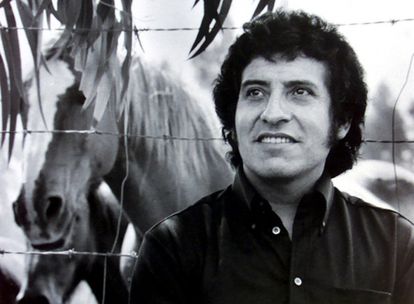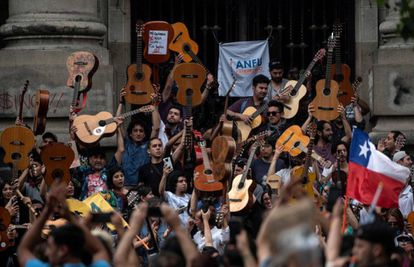
The Chilean Supreme Court has definitively convicted seven former soldiers of the aggravated kidnapping and homicide of singer-songwriter Víctor Jara on the eve of the 50th anniversary of his death when he was arrested in the Estadio Chile (now named the Estadio Víctor Jara) following the 1973 coup d’état. The composer was murdered together with Littré Quiroga, who was the director of the National Prison Service under the government of the overthrown socialist president Salvador Allende (1970-1973). Both spent their final hours of life together, in fear and isolated from the other prisoners in a locker room.
Víctor Jara was arrested on September 12, 1973, one day after the coup led by Army General Augusto Pinochet, and taken to the Estadio Chile. The singer-songwriter, together with Quiroga, was one of over 5,000 Allende supporters arrested by the military. There, according to judicial testimonies, they were brutally tortured for three days. Jara suffered 56 bone fractures and was shot 44 times, while Quiroga had 47 fractures and received 23 bullets.
The bodies of both Communist Party members were thrown into a vacant lot near the railway line, in the vicinity of the Metropolitan Cemetery, on September 16, 1973.
According to the Supreme Court ruling, which was unanimous, former soldiers Raúl Jofré González, Edwin Dimter Bianchi, Nelson Haase Mazzei, Ernesto Bethke Wulf, Juan Jara Quintana and Hernán Chacón Soto were sentenced to 15 years and one day in prison as perpetrators of the murders. They also received 10 years and one day for the crime of aggravated kidnapping. Former army officer Rolando Melo Silva was sentenced to 5 years and one day and another 3 years and one day in prison as accessory after the fact to the murders and kidnappings, respectively.
According to the sentence, “the prisoners of certain public connotation were identified by the military personnel and separated from the rest, and during the respective periods of their detention, both Víctor Jara Martínez and Littré Abraham Quiroga Carvajal were recognized by the military personnel” and then “separated from the bulk of the prisoners and assigned special custody, suffering constant and violent episodes of physical and verbal aggression throughout their captivity.”
In the case of Jara, the ruling states: “The main reason for the aggression was his artistic, cultural and political activity, closely linked to the recently overthrown government.” It adds that he was subjected to “physical torture, the most severe blows being those he received to his face and hands. Both victims were subjected to kicks, blows with fists and blows with the butts of guns.”
Quiroga was targeted having been accused of responsibility for the imprisonment and mistreatment of Army General Roberto Viaux, “which aggravated the punishment he was given […] the conscripts themselves were encouraged to take part in the punishment.” Viaux had led an attempted military uprising in 1969.
Jara, one of Chile’s most celebrated singer-songwriters, was 40 years old when he was murdered. He was married to Joan Jara and father to two daughters, Amanda and Manuela.
Littré Quiroga was 33. On the day he was arrested in his office, he wrote three letters: to his wife Silvia, to his mother, and to his three young children. “Little children: behave well and eat all your food. Study hard and help your mother. Dad may not be able to see you for some time. Don’t watch too much television and behave properly, like good children. Bye-bye and don’t forget your daddy. Be happy, Littré Quiroga C.”

“Infamous crimes”
The legal cases of Víctor Jara and Littré Quiroga are two examples of the long process of human rights violations committed during the Pinochet dictatorship in Chile.
In the case of Jara, the first criminal complaint was filed in 1978 by his widow in Santiago. At that time, it was handled by prosecutor Luis Ortiz Quiroga, but the case was taken over 20 years ago by human rights lawyer Nelson Caucoto, who also represents Quiroga’s family.
In 1979, dozens of letters were sent to former prisoners at the Estadio Chile to ask for information about the death of the singer-songwriter. In Quiroga’s case, the first complaint was filed in 1987.
Both cases were shelved for years by the Chilean justice system, but were reactivated in 1998, after Pinochet’s arrest in London by order of Spanish investigative judge Baltasar Garzón. Another key event a judicial reform promoted in 1997 by the government of then-president Eduardo Frei Ruiz-Tagle, which allowed a renewal of the Supreme Court and the departure of many of the magistrates who had been appointed during the dictatorship.
Two investigative judges handled the case, initially Juan Carlos Urrutia and later Miguel Vásquez, who issued indictments against the former soldiers. In 2021, the sentences were raised by the Santiago Court of Appeals, and have now been upheld by the Supreme Court.
After learning of the sentence, Caucoto told EL PAÍS that the Supreme Court had closed the book on “two infamous crimes against two people who were very relevant in Chilean society: Víctor Jara and Littré Quiroga. One, for being an icon of the musical and cultural pantheon and the other, for being an exemplary public servant. Both were tortured to death, in a cowardly manner, and riddled with dozens of bullets and their bodies were dumped in a public thoroughfare in the anonymity of the dawn of Santiago.”
Caucoto praised the work of the judges of the Criminal Chamber of the Supreme Court, the ministers Haroldo Brito, Jorge Dahm, and Eliana Quezada, and the lawyers Carolina Coppo and Leonor Etcheberry, who sentenced the seven former soldiers in a unanimous vote: “Justice has done its duty with absolute adherence to the law, both national and international, bringing comfort to the families of the victims who have waited so many years for this moment,” he said.
Sign up for our weekly newsletter to get more English-language news coverage from EL PAÍS USA Edition
This post was originally published on this site be sure to check out more of their content.








